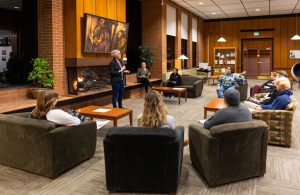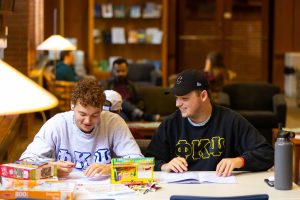Valparaiso University Leading a National Discussion on Faith-Based Learning

What does it mean to be a Lutheran institution? What is the role of religion in the academic sector? How does a faith-based institution live out its identity?
Those are the questions that Mark Schwehn ’67, Ph.D., former dean of Christ College — the Honors College and former provost of Valparaiso University, grappled with in the early nineties. They were questions that he, the son of a pastor with a passion for academia, seemed uniquely poised to address. His passion for learning was pushed further as an undergraduate at Valpo.
“I was supposed to become a pastor myself — because there had been a long line of them in my family — but early on I decided that it didn’t fit me,” Provost Schwehn says. “I came here and I very quickly fell in love with learning and with the thought that I could make a living and get paid to do what I enjoyed, which was reading, writing, talking, teaching.”
Mark went on to earn his Ph.D. at Stanford ,while teaching American History at the University of California San Jose, and, upon graduating in 1975, took a full-time position at the University of Chicago. His experiences in the secular academic world had a profound impact on his view of higher education as a whole and drove him to return to a faith-based institution as a professor of humanities at Valpo’s Christ College.
“There were certain questions that you were freer to ask in church-related places than you were in secular places, such as the relationship between faith and learning,” Provost Schwehn says.
The barrier between the secular and religious worlds was — and to a lesser degree still is — a heavily-enforced divide in higher education. While the basic facts surrounding the histories and practices of various faiths could be considered academically valid from the standpoint of objective learning, exploring the values and ideas of religious institutions and how they relate to our experiences today were less accepted in academia.
“Religion was not seen as a proper subject of study,” says Joe Creech, Ph.D., program director for the Lilly Fellows Program at Valpo. “Religion was seen as something that was largely in contention with the aims of higher education.”
In 1993, Provost Schwehn wrote a book titled “Exiles from Eden: Religion and the Academic Vocation in America” for Oxford University Press. The book was a critique of the philosophies of higher education and called for a reappropriation of the religious values underpinning all of modern academia, and its arguments caught the attention of the Lilly Endowment

Lilly Foundation Inc. is a private, Indianapolis-based, philanthropic organization that supports causes related to community development, education, and religion, with a special emphasis on programs that relate to the development of young people. Working with Provost Schwehn, who was a professor of humanities with Christ College at the time, it was decided that the Endowment would fund a new venture in Christian higher education: the Lilly Fellows Program. Today, the program has become a key partner with the Lilly Endowment, and has a major impact on Valpo and beyond.
The most visible impact of the program on Valpo’s campus are the postdoctoral fellows that it brings to campus for two-year teaching positions with various departments. Fresh out of their Ph.D. programs, these postdoc fellows bring new energy and exciting ideas to an environment where they can be put to the test.
“Usually when you come in to teach as a new faculty member you get whatever the other faculty don’t want to teach,” Jennifer Prough, Ph.D., interim dean of Christ College and associate professor of humanities and East Asian studies, says. “This program lets faculty test out something new and innovative, and our students get to experience the latest research, questions, and pedagogy in education today.”
Becoming a Lilly Fellow is an extremely exclusive, high-intensity process that assures that only the best of the best in a particular field find their way to the classroom at Valparaiso University. For the fellows, the environment of freedom comes with the additional benefit of having the influence and guidance of experienced professors to help them earlier in their teaching careers. For established professors at Valpo, they benefit from working with ultra-high achieving young professionals that bring new ideas and fresh perspectives to their fields.
Alumni of the Lilly Fellow program go on to have an immense impact in higher education and academia in general. University of Notre Dame provost John T. McGreevy, Ph.D., John C. Calhoun biographer Bob Elder, Ph.D., and countless other professors and college administrators had their ideas fostered and their skills mentored through the Lilly Fellows Program.
“These folks go on to tremendous careers, and when you talk to them,” Joe says. “They say that the formative faculty experience that really set them on their course was here at Valparaiso University.”
The presence of the Lilly Fellow postdocs only scratches the surface of what the overall program accomplishes. Outside of Valpo, and largely unknown to those at the University, the Lilly Fellows Program has made national waves for its support of faith-based institutions and professionals through the Lilly Network of Church-Related Colleges and Universities.
“The thing that is often invisible here on campus is that it’s a network of over 100 schools that join and pay dues to attend conferences and think together about the overall themes of religion and higher education,” Dean Prough says.
Through the growth of the Lilly Network from 30 institutions at its inception to over 100 schools today, the Lilly Fellows Program at Valparaiso University has become a re-granting agency that receives funding from the Lilly Endowment and redistributes it across the network’s member schools. The money funds conferences, speakers, and mentoring initiatives that bring new and old faculty members into the ongoing discussion of how their institutions can embody faith-based learning.
“The Lilly Fellows program continues what is the oldest conversation in higher education,” Provost Schwehn says. “This is the place that’s carrying that forward on a national basis.”

So, what does it mean to be a Lutheran institution? According to former Provost Schwehn, it’s not a simple answer, but a lot of it comes down to how Valparaiso University views the relationship between learning and faith.
“There’s a way in which Lutherans want to insist that when it comes to ultimate questions, transcendent issues, knowledge by itself won’t avail you anything,” Provost Schwehn says. “You can be the smartest person on earth, but to quote Paul, ‘we can be wise, but if we have not love, we have nothing.’ Lutherans want to supplement the power of reason in the academic disciplines with the exploration of matters of ultimate faith and destiny, where knowledge by itself will prove woefully insufficient.”
Provost Schwehn also emphasizes that, in the Lutheran academic tradition, there is not a separate, Christian version of mathematics or biology, and a scholar is called to excel at the more secular branches of education just as much as the branches of faith. Quoting Martin Luther, he says “a good Christian cobbler is called to make good shoes, not shoddy shoes with crosses on them.” In discussing matters of life and lived experience, however, it would be remiss to not include discussion of faith.
“People have different ways of thinking about it, but rather than saying ‘you have religion or secularism and they’re completely at odds,’ we say religion is just a part of life, and people have different positions on it,” Dean Prough says. “They’re not at loggerheads. Faith, belief, spirituality is a part of human life, so it should be a part of what we talk about in the classroom.”
The discussion of faith-based identity and how best to live those philosophies in academia is ongoing, and its role in facilitating that discussion has brought recognition and respect to Valparaiso University as a whole.
“People are grateful to Valparaiso and the quality of the scholarship that has set the table for conversations within humanities disciplines,” says Provost Schwehn. “And our rankings are often due to the fact that people across the country know the Lilly Fellows Program.”
Moving forward, the Lilly Fellows Program hopes to grow its Network and branch out from the humanities to include STEM programs in the discussion of faith and learning. To learn more about the Lilly Fellows Program and what it offers to individuals and institutions, visit their website at www.lillyfellows.org.
